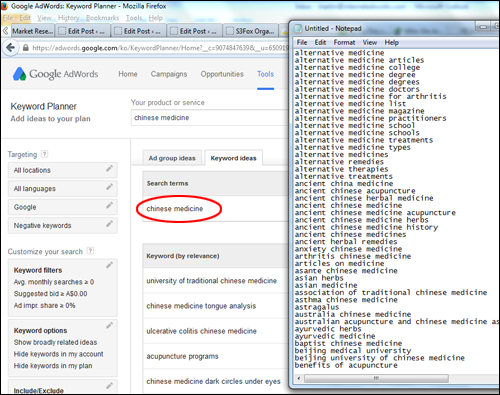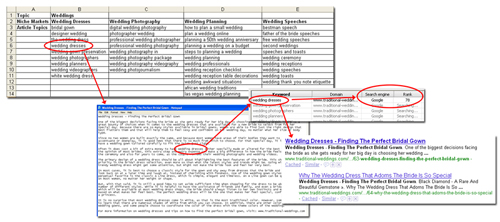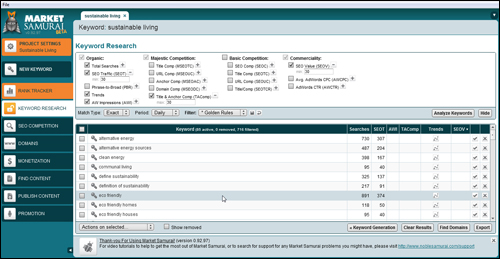 Keyword research is an important aspect of doing market research and an integral part of other strategies presented in our tutorials (e.g. content creation, online advertising, etc.)
Keyword research is an important aspect of doing market research and an integral part of other strategies presented in our tutorials (e.g. content creation, online advertising, etc.)
Knowing how to do effective keyword research can help you to:
- Quickly identify new niche opportunities in your existing market,
- Discover new opportunities in related markets,
- Generate great ideas for web content,
- Generate great ideas for new products or services,
- Improve your website’s relevance in search engines
- Create a list of potentially profitable advertising words for pay-per-click advertising (e.g. Google AdWords),
- And more …
How To Research Keywords For SEO Content
Keyword research doesn’t have to be difficult or time consuming.
In this tutorial, we’ll show you a couple of tools that can help you create a highly targeted listing of relevant keywords for your niche.
Let’s Build A Keyword List … Fast!
Just like generating ideas for a website, product or business in a niche market, the simplest way to start is by writing down keywords and keyword phrases that relate to your niche, and search terms that people are likely to enter into search engines when looking for information.
For example, if you plan to start a website showcasing scrapbooking products and ideas, your keyword list might look something like this:
- Scrapbook Layout Ideas
- Free Scrapbooking Templates
- Scrapbooking Tutorials
- Scrapbooking Accessories
- etc …
Also include question-based keyword phrases that people might enter into search engines, like:
- How do I create scrapbook pages?
- What is digital scrapbooking?
- Where can I buy scrapbooking supplies?
- etc …
Add Related Keyword Ideas
You also want to consider related words and possible synonyms for your niche topic.
For example, if you were trying to build a keyword list related to “freelancing”, you could also use words like:
- Ghostwriting, Ghostwriter
- Writing, Writer
- Telecommuting, Telecommuter
- Work At Home, Work From Home
- etc …
Write down everything that you can think of related to your niche market.
![]()
Here’s a quick tip …
Google has a great keyword suggestion tool built into its search engine.
Go to Google.com and begin typing your main keyword to see related keyword ideas …

Add the keywords Google suggests to your list, then repeat the process using your new keywords …

Keep repeating this process. After a few minutes, you should have a great list of keywords to start with.
Finding Profitable Opportunities In Good Keywords
When doing keyword research for a niche market, your goal is to build a list of targeted keywords that ideally will meet the following criteria:
- Keywords that attract a reasonable volume of searches online.
- Keywords that will generate profitable returns for your business.
- Keywords that have lower competition.
Keyword Search Volume is important because if nobody is searching for your keywords, then you will be wasting your time and money marketing your content to an audience that isn’t there.
On the other hand, going after a really high volume of searches online means a lot of competition. Once again, you could be wasting your time vying for traffic from a market that is being constantly hit by many established players with big budgets to spend on advertising and promotion.
A Profitable Keyword is a keyword that either brings you targeted visitors in the organic search results (i.e. free listings), or a keyword that you can afford to keep paying to advertise your products or services with (e.g. using Google AdWords) because it brings you targeted visitors that convert into leads or customers and generate a positive return on investment for you (ROI) …

As a rule of thumb, unless you really know what you are doing, stay away from trying to dominate large markets (e.g. ‘Travel’, ‘Health’, ‘Pets’, etc.), and go after ‘niche’ and ‘micro-niche’ markets instead.
A ‘Niche’ market, focuses on a narrower subset of a larger market. Here are some examples of niche markets:
- Dog training collars
- Remove acne scar
- Blue contact lenses
- Health supplement coupons
- Wedding speeches
![]()
Tip: A good general rule of thumb when doing niche market research is to look for keywords that generate between 30,000 and 100,000 search a month and have a low-to-medium level of competition …

Research Niche-Related Keywords
As you begin to generate ideas for your niche, write down keywords and keyword phrases related to the niche market you are thinking of expanding into.
This is important for a number of reasons:
- It will help you identify additional opportunities in your niche that you may have missed
- Keyword research can provide you with new content ideas and keyword phrases that you can use when creating your content.
- Search engines like Google use the keywords on your website pages to determine what your niche is and how relevant your site is to users searching online for information. This can help improve your site’s search engine ranking results and increase the number of people finding and visiting your site.
Once you have a basic list of niche-related keywords, you can expand your list significantly with keyword research tools like Google’s Keyword Planner and other tools …

(Google AdWords – Keyword Planner)
After evaluating potentially lucrative niches and doing niche keyword research, the next step is to understand who your buyers are. This is covered in other tutorial.
Long-Tail Keywords
Long-tail keywords are longer, less common, but very specific keyword phrases that have at least 3-4 keywords in them.
For example:
- compare prices minolta x-700 vs pentax k1000
Long tail keywords make up the majority of search-engine driven traffic, and are generally very good indicators of a person’s desire to buy (as opposed to ‘just looking’ online).
Commercial Intent Keywords
Commercial intent keywords are words that people add when searching for something that they are serious about investing money or time into (as opposed to just browsing or ‘researching’).
Examples of commercial intent is when people add words like the following to their searches:
- Buy + Keyword
- Keyword + price
- Cheap + keyword
- Quote for + Keyword
- Keyword + specials
- Keyword + cost
For example:
- Buy Porsche 918 Spyder
- Fitness 365 membership price
- Cheap bed mattress
- Quote for landscaping yard
- etc…
Adding locations (names of places) to keywords also indicate a more serious commercial intent:
- Buy + Keyword + Location
- Keyword + price + Location
- Cheap + Keyword + Location
- Quote for + Keyword + Location
- Keyword + specials + Location
- Keyword + deals + Location
- etc …
![]()
Free Download: Commercial Intent Keyword List

(Commercial intent keywords)
Keyword-Based Content
Once you find the right keywords, you can start writing content for your site based on these keywords …

Google has an excellent Keyword Planner tool that you can access at no cost if you have a Google AdWords account (https://adwords.google.com) …

![]() To access Google AdWords, visit the site below:
To access Google AdWords, visit the site below:
Another good keyword research tool is Market Samurai …

Market Samurai is not free but it is also not expensive and provides some great additional research tools, plus excellent training tutorials on how to perform keyword research.
![]() To learn more about Market Samurai, visit the site below:
To learn more about Market Samurai, visit the site below:
LSI Keywords
Google is continually improving the way it analyzes content on websites.
Google uses a relatively new method called Latent Semantic Indexing (LSI) which identifies patterns in the relationships between the terms and concepts used in the text of a web page, to work out how relevant your content is to users searching online.
It’s important, therefore, to understand what Latent Semantic Indexing is, and how to use it when doing keyword research. The video tutorial section at the bottom of this page has more information on using LSI keywords.
Keyword-Based Domains
Finding good, keyword-based domain names in any niche is getting harder to do.
![]() To learn how to quickly and easily find many available keyword-rich domain names, see the tutorial below:
To learn how to quickly and easily find many available keyword-rich domain names, see the tutorial below:
![]() How To Easily Find Available Keyword-Rich Domain Names
How To Easily Find Available Keyword-Rich Domain Names
We hope that you have found the information above useful for helping you to research and identify great keywords for SEO content.
***
"I am beyond impressed with what you have put together. I can tell that you put a ton of hard work into building what you have. You have the absolute best content on WordPress I have ever seen!" - Robert T. Jillie
***

